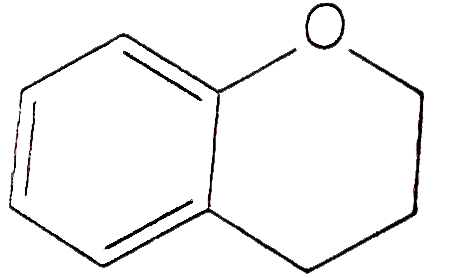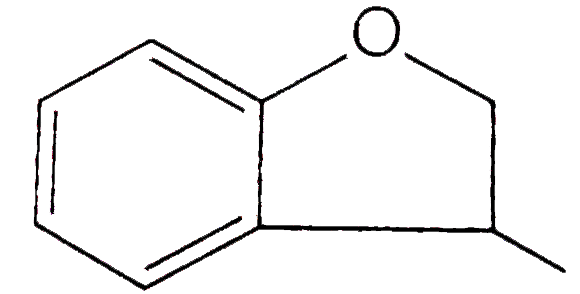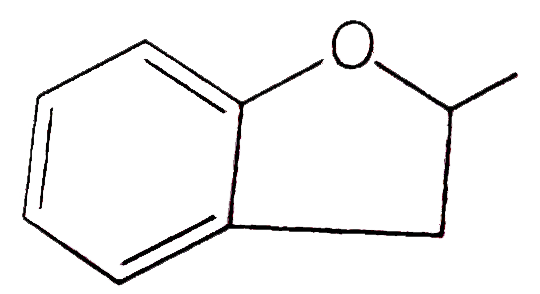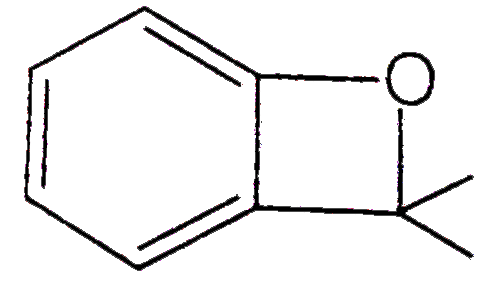An organic compound A (C9H10O) does not evolve any gas on reatement with Na-metal but on hydrolysis with dil. H2SO4 gives B(C9H12O2) which on further treatement with alkaline solution of iodine gives an yellow precipitate. Also A on treatment with excess of conc. HBr gives C(C9(H11OBr) as the major product. C on further treatment with C2H5ONa/C2H5OH followed by acidification of product gives D (an isomer of A). D on ozonolysis followed by work-up with dimethyl sulphide gives ortho hydroxyl benzaldehyde as one of the product. Answer the following three questions based on the above information.
The statement that is true regarding A to D is
it oxygen of A is labelled by .18O,D will retain .18O
If A is hydrolyzed with H2O18/H+, B will have .18O on phenyl ring
A can show both enantiomersim and diasterecomerism
B can show both enantiomerism as well as diasterecomerism.
The correct Answer is:a
Topper's Solved these Questions
Similar Questions
A compound D(C8H10O) upon treatement with alkaline solution of iodine gives a yellow precipitate. The fibtrate on acidification gives a white solid E(C7H6O2). Write the structures of D,E .
View SolutionA compound A (C8H10O) upon treatment with alkaline solution of iodine gives a yellow precipitate. The filtrate on acidification gives a white solid B (C7H6O2). Write the structures of A and B.
View Solution
Knowledge Check
- Question 1 - Select One
An organic compound A (C9H10O) does not evolve any gas on reatement with Na-metal but on hydrolysis with dil. H2SO4 gives B(C9H12O2) which on further treatement with alkaline solution of iodine gives an yellow precipitate. Also A on treatment with excess of conc. HBr gives C(C9(H11OBr) as the major product. C on further treatment with C2H5ONa/C2H5OH followed by acidification of product gives D (an isomer of A). D on ozonolysis followed by work-up with dimethyl sulphide gives ortho hydroxyl benzaldehyde as one of the product. Answer the following three questions based on the above information.
Which of the following statement regarding B is correct?AB is an optically inactive substanceBB is an optically active substance with same configuration as that of ACB is an optically active substance with opposite configuration to that of A.DA pure enantiomer of "A" will produce, on hydrolysis reaction, a racemic mixture of B - Question 2 - Select One
An organic compound A (C9H10O) does not evolve any gas on reatement with Na-metal but on hydrolysis with dil. H2SO4 gives B(C9H12O2) which on further treatement with alkaline solution of iodine gives an yellow precipitate. Also A on treatment with excess of conc. HBr gives C(C9(H11OBr) as the major product. C on further treatment with C2H5ONa/C2H5OH followed by acidification of product gives D (an isomer of A). D on ozonolysis followed by work-up with dimethyl sulphide gives ortho hydroxyl benzaldehyde as one of the product. Answer the following three questions based on the above information.
The most likely structure of starting compound A isA B
B C
C D
D
- Question 3 - Select One
2-Iodobutane on treatment with C2H5Ona/C2H5OH yields but -2-ene as the major product. This regioselecetion is in accordance with the
AHoffmann ruleBSaytzeff ruleCMarkovniko ruleDKharasch rule
A compound D(C8H10O) upon treatement with alkaline solution of iodine gives a yellow precipitate. The fibtrate on acidification gives a white solid E(C7H6O2). Write the structures of D,E and explain the formation of E.
View SolutionA compound D(C6H10O) upon treatment with alkaline solution of iodine gives a yellow precipitate. The filtrate on acidification gives a white solid E(C7H6O2). Write the structures of D and E and explain the formation of E.
View SolutionA compound (D)(C8H10O) upon treatement with alkaline solution of iodine gives a yellow precipitate. The filterate on acidification gives a white solid (E)(C7H6O2). Write the structures of (D) and (E), and explain the formation of (E).
View Solution
Why does not (C) gives (D) or (D1) on treatment with alcoholic KOH or with C2H5ONa+C2H5OH?View Solution
Why does not (C) gives (D) or (D1) on treatment with alcoholic KOH or with C2H5Ona+C2H5OH?View Solution
